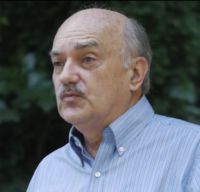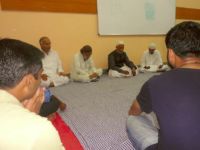Members from the Centre for Peace and Spirituality (CPS) discussed ‘Interfaith dialogue, Peace, and Dawah’ with the students of theology at Vidyajyoti College of Theology (Delhi) on 25 November 2014 in a long afternoon session. The students at Vidyajyoti do two basic courses on Islam and Christian-Muslim Dialogue.
Explaining the importance of interfaith dialogue in an atmosphere of misunderstanding about religion, Mr. Rajat began by talking about the approach to dialogue. There is diversity everywhere in nature, and religion cannot be exempted from this universal law of diversity. Thus, the idea that dialogue should be held for the purpose of eliminating all differences from religion and bringing about uniformity or oneness is not in accordance with the law of nature.
Then, another current pattern of dialoguing is where the participants try to establish their superiority over the other, and therefore resort to polemics and debate. However, this form of dialogue too cannot yield any positive result. The principle of holding dialogue, given by Islam and also followed by CPS, Mr. Rajat said, is based on mutual learning. Participants in a dialogue should seek to learn from each other and thereby enrich themselves intellectually and spiritually. By enumerating various examples from Islamic history, Mr. Rajat stressed that Islam does not only lay down principles of dialogue, but also gives practical demonstrations. A prominent example from the early period of Islam is of the tripartite talks held between representatives of three religions – Islam, Judaism and Christianity, in the Prophet’s mosque in Madinah.
In relation to interfaith dialogue a question that arises is regarding the concept of dawah in Islam. What is dawah and why has this task been enjoined to the Muslims. The next speaker, Sadia, addressed these questions. Dawah ilallah is an Arabic word which literally means ‘the call to God.’ One of the verses of the Quran addresses the Prophet thus: “Call to the way of your Lord with wisdom and fair exhortation and reason with them in a way that is best.” (16:125) Dawah also means to convey the message of God to people.
The purpose of dawah is to acquaint people with the creation plan of God. According to this plan, God has created man as an eternal creature and divided his lifespan into two: the pre-death period and the post-death period. The pre-death phase is meant for one’s own preparation to meet the Lord. According to the Quran, one’s success in the eternal world of the Hereafter depends upon the kind of personality one has developed in this world. It is this reality of life that the Prophet conveyed to his contemporary people. This was the central theme of the Prophet when he interacted with people. He aimed at developing in people that personality which could find entry to Paradise. This task was accomplished by reciting passages from the Quran because its entire content is concerned with making the reader aware of the nature of existence. In this sense, one can say that the Quran is a book of dawah. Sadia added in the end that the nature of dawah was purely other-worldly and it aimed at directing people’s attention toward the reality of the afterlife.
Dawah is a non-political task and aims to convey, through peaceful means, God’s message to people. However, there are some people who have given a political interpretation to the mission of the Prophet, according to which the goal of Islam is to acquire political power and establish an Islamic state. In this regard, Maria pointed out that the meaning of dawah or the mission of the Prophet has to be drawn directly from the Quran, which is the scripture of Islam. Because determining the purpose of sending the Prophet is a very important matter. In order to make a statement on this, it is essential to have a direct reference from the Quran. As far as establishing an Islamic state is concerned, there is no such verse in the Quran which says: ‘O Prophet, establish an Islamic state or Islamic government.’ On the contrary, there are several verses in the Quran that directly enjoin the Prophet to preach the message of God. For example, the Quran says: “The duty of the messengers is only to convey the message clearly.” (16:35)
Religion, according to the Quran and Hadith, is religion of self-following, that is, one should follow the teachings of Islam in one’s individual life. However, the political interpretation of Islam wrongly made religion a subject of external implementation, that is, the commandments of Islam should be implemented on others by force or by ruling over them. It is this interpretation that has led to violence. The recent violence being perpetrated by outfits such as the ISIS is an example of this misinterpretation. Because, these people want to establish their political system in society, but they see that somebody is already occupying the seat of power. Thus, in order to overthrow those in power they engage in violent clash with them.
Understanding the nature of the mission of the Prophet, Maria noted, was important for understanding Islam. The purpose of the Prophet was not to become ruler over people, rather it was to change the hearts and minds of people. The Prophet works toward developing in a person the sense of God-consciousness and he yearns that every individual should become noble as regards his deeds and actions, so that one achieves the goodness of this world and the Hereafter.
CPS, under the guidance of its founder, Maulana Wahiduddin Khan, is working to promote peace both at the level of the individual and at the level of society. Sufia gave an exposition of this ideology of peace. Maulana believes that individual minds need to be transformed because individuals constitute the basic units of society. At the individual level, Maulana emphasizes the importance of converting negative thinking into positive thinking. This is of crucial importance when seen in the context of the creation plan of God mentioned in the Quran. According to the creation plan, God has bestowed freedom on human beings in order to test us in this world. Obviously, where there is freedom, there is also misuse of freedom. There will always be such individuals in society who choose to misuse their freedom. All the problems and evils in society are the result of people misusing their freedom.
Problems will always remain in society, they cannot be entirely eliminated. In the light of this reality, the only option we have when faced with unpleasant circumstances is that we should convert our negativity into positivity. This is the only way by which we can live with peace of mind in this world. If we do not learn to convert negativity into positivity, then we will never experience peace of mind in this world. Therefore, according to Maulana, peace of mind is related to one’s way of thinking and not the external environment.
To promote social peace, Sufia explained, Maulana believes that adhering to peace or adopting a peaceful course of action in challenging circumstances is possible only when there is a very strong justification for peace. The truth is that where there is peace, there are opportunities. Opportunity is an integral part of peace and opportunity is essential for all kinds of constructive activities. Without peace, there is no opportunity, and without opportunity there is no scope for progress and development. We must maintain peace unilaterally, for nothing that we desire can be achieved without it. The option for us is not between peace and no peace, but between peace and annihilation. Therefore, Maulana advocates the establishment of peace for the sake of peace.
Ms. Naghma Siddiqi said toward the end that according to Islam, God had created this world for the purpose of test. Here, people are free to act in whichever way they want because they are being tested. Thus, anything that encroaches on people’s freedom and puts curbs on their freedom of expression or thought could not be Islam.
After the presentations the students shared their observations about Islam and sought clarification on various issues. A student asked whether Islam restricted women from going outside and interacting with others. Ms. Naghma said that Islam emphasized on education for both Muslim men and women. Moreover, Islam believes in according equal respect to both men and women, as exemplified by a saying of the Prophet: ‘Men and women are two equal halves of a single unit.’ One of the questions was about the branding of Muslims as terrorists. Why are members of a particular community profiled as terrorists when they are not directly responsible for the terrorism perpetrated by certain persons from their community? Sadia responded that Muslims do need to take responsibility for the acts of terror being done in the name of their religion. They should openly condemn this violence and explain why it is not part of Islam. Thus, the blame does not lay outside of the Muslim community. Muslims must cease to provide such news to the media that showed that their religion was one that condones violence. Mr. Rajat added that those Muslims who were engaged in active violence cannot be stopped by force, rather they have to be provided with a counter-ideology which convinces them that Islam is a religion of peace. CPS was engaged in this very task.
Centre for Peace and Spirituality seeks to help people to understand the value of tolerance and avoidance as opposed to intolerance and confrontation. It is from such intellectual awareness alone that a non-violent world and a peaceful society can be constructed. Dr Victor Edwin SJ the course director made all the arrangements. It was a fruitful evening of dialogue.
CPS International, based in New Delhi, is an organization founded by the Islamic scholar Maulana Wahiduddin Khan. CPS members are pursuing studies in Islam. Rajat Malhotra is a research scholar in Islamic history at Mewar University. Sadia Khan is a research scholar at Department of Islamic Studies, Jamia Millia Islamia. Naghma Siddiqi and Maria Khan are doing PhDs in Islamic Studies at Jamia Hamdard and Sufia Khan is doing Master’s in Islamic Studies at Jamia Millia Islamia. Rajat Malhotra spoke on Interfaith Dialogue in Islam, Sadia Khan spoke on Understanding the Concept of Dawah, Maria Khan spoke on Political Interpretation of Islam, Sufia Khan spoke on Ideology of Peace, and Naghma Siddiqi provided a summary of the CPS message. The talks were followed by a question and answer session.



Leave A Comment
You must be logged in to post a comment.